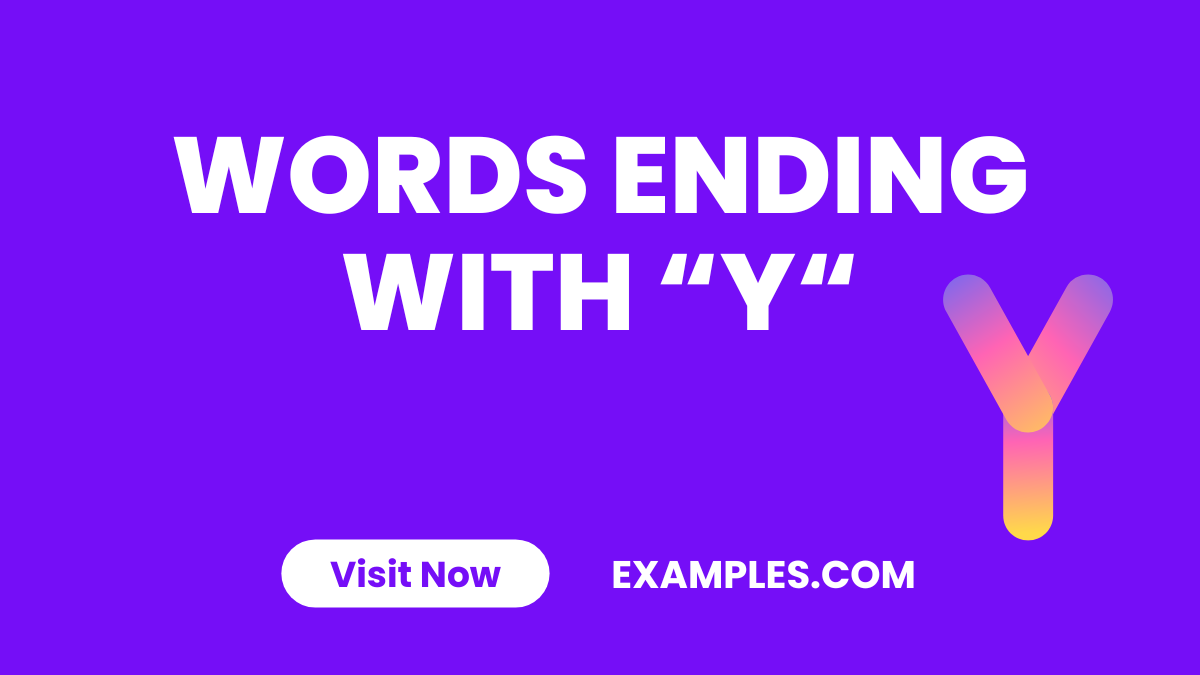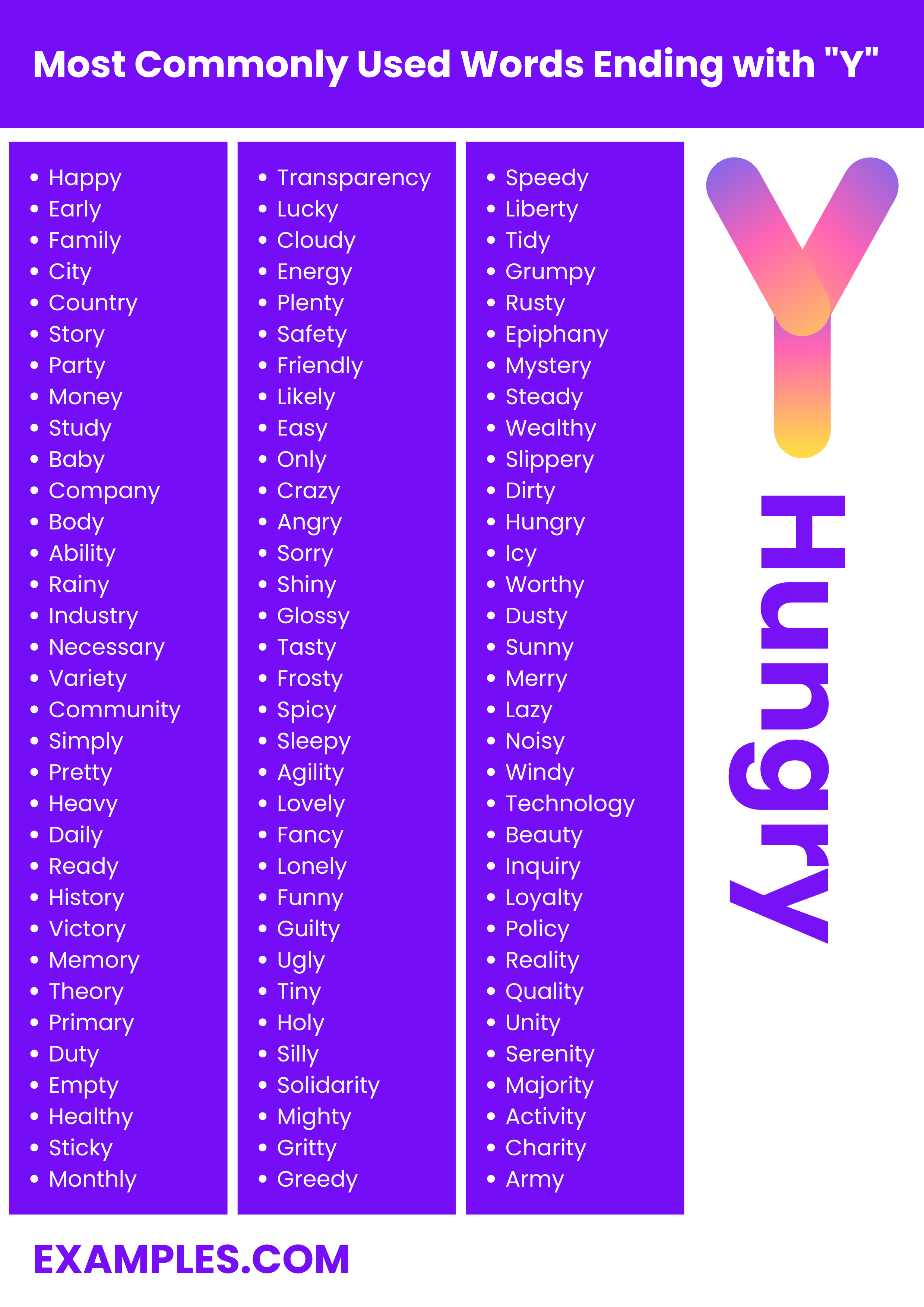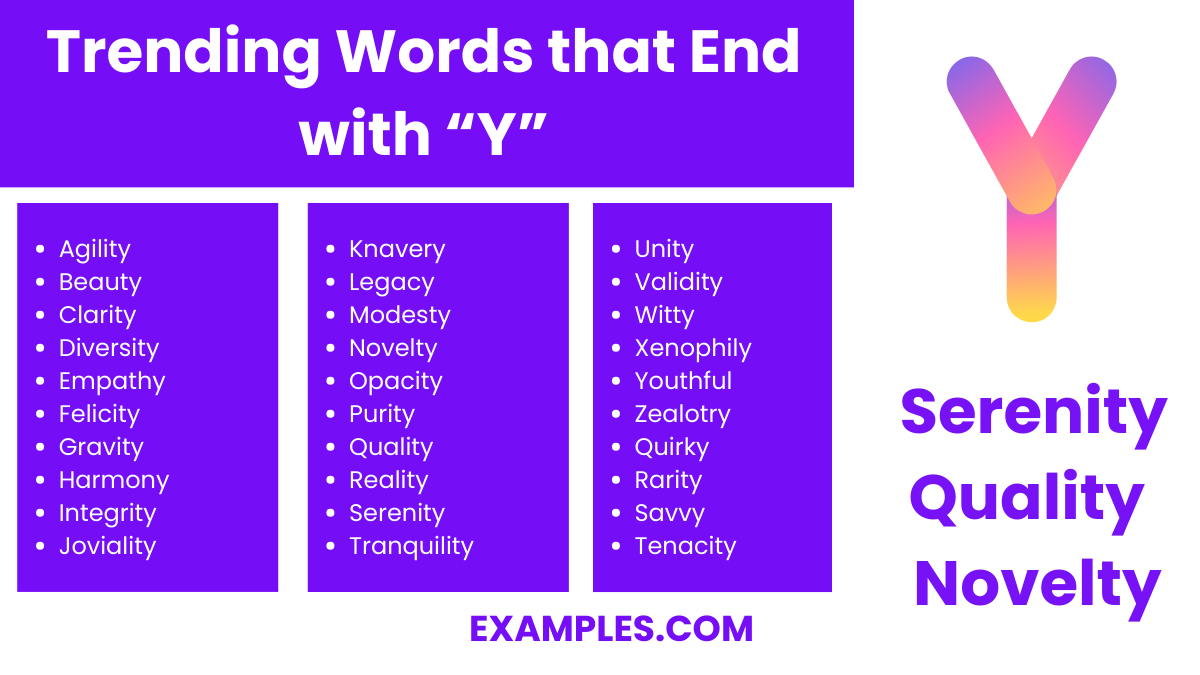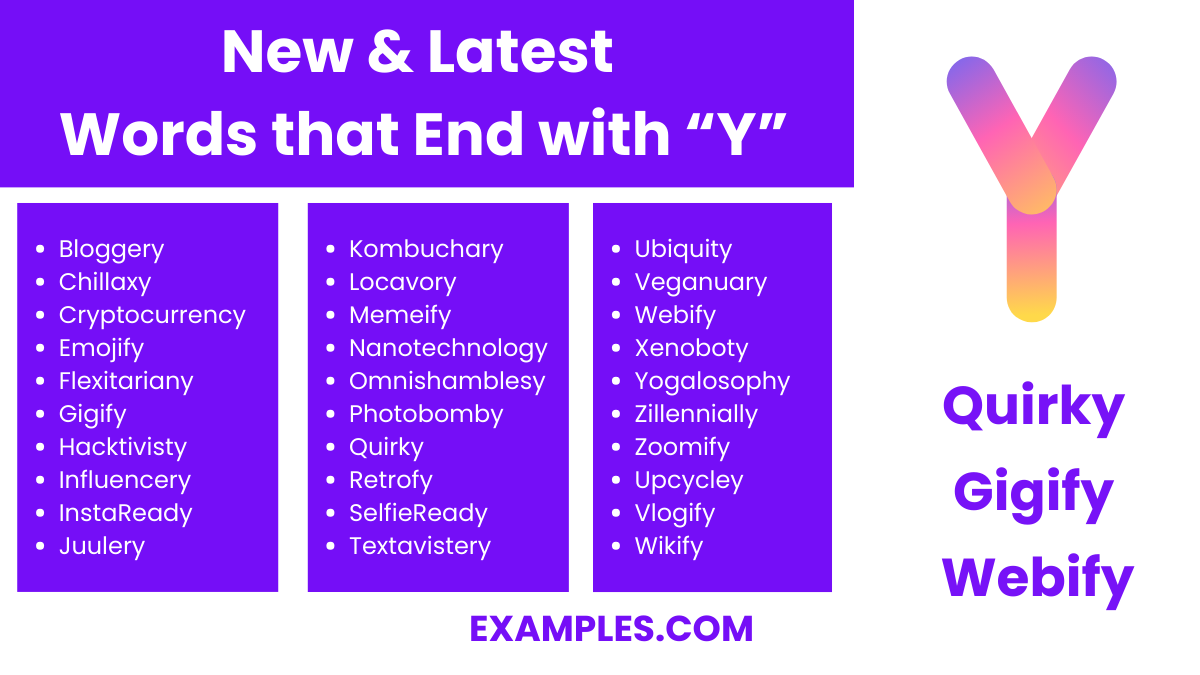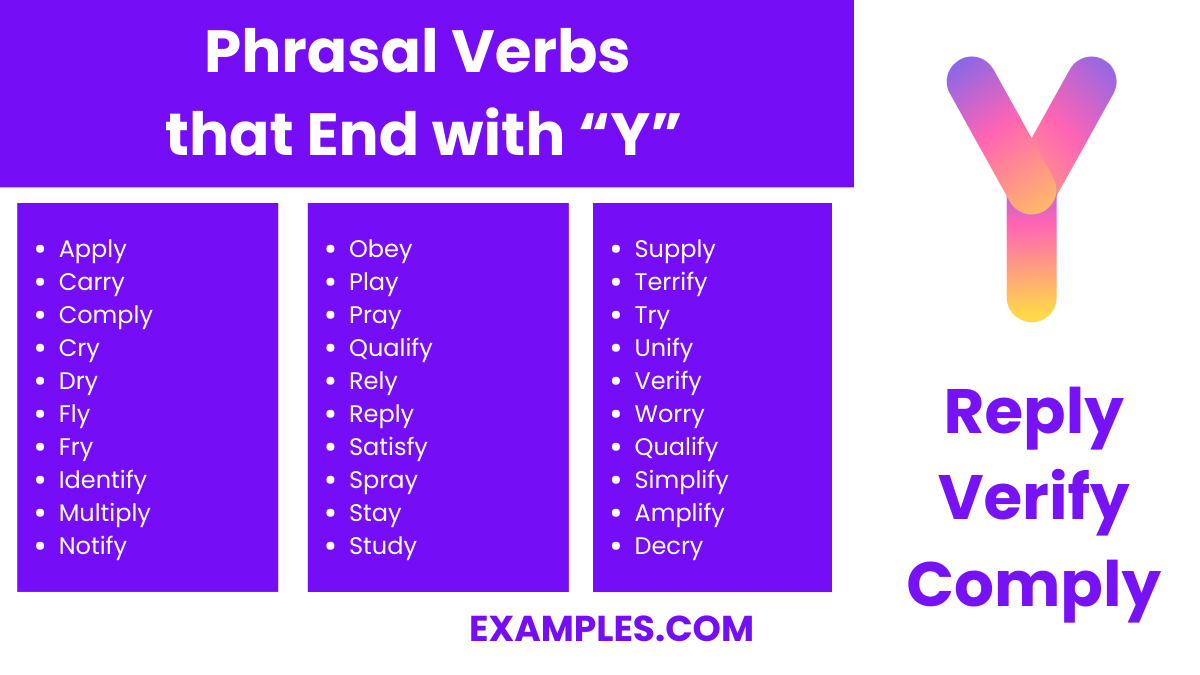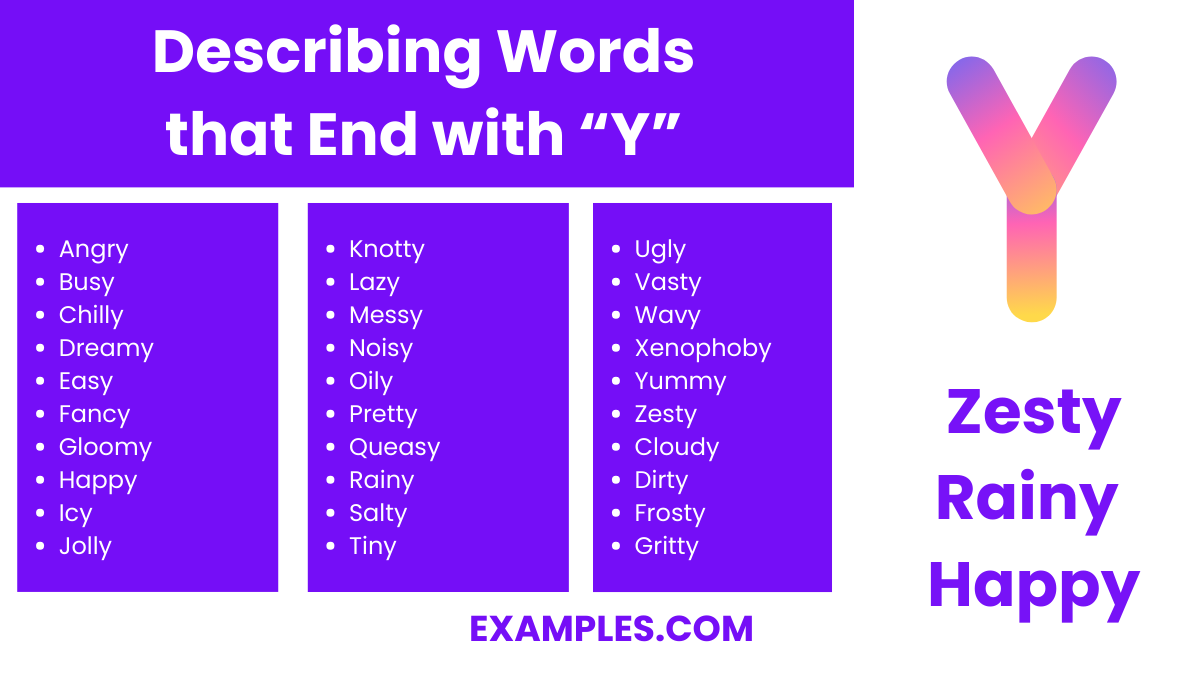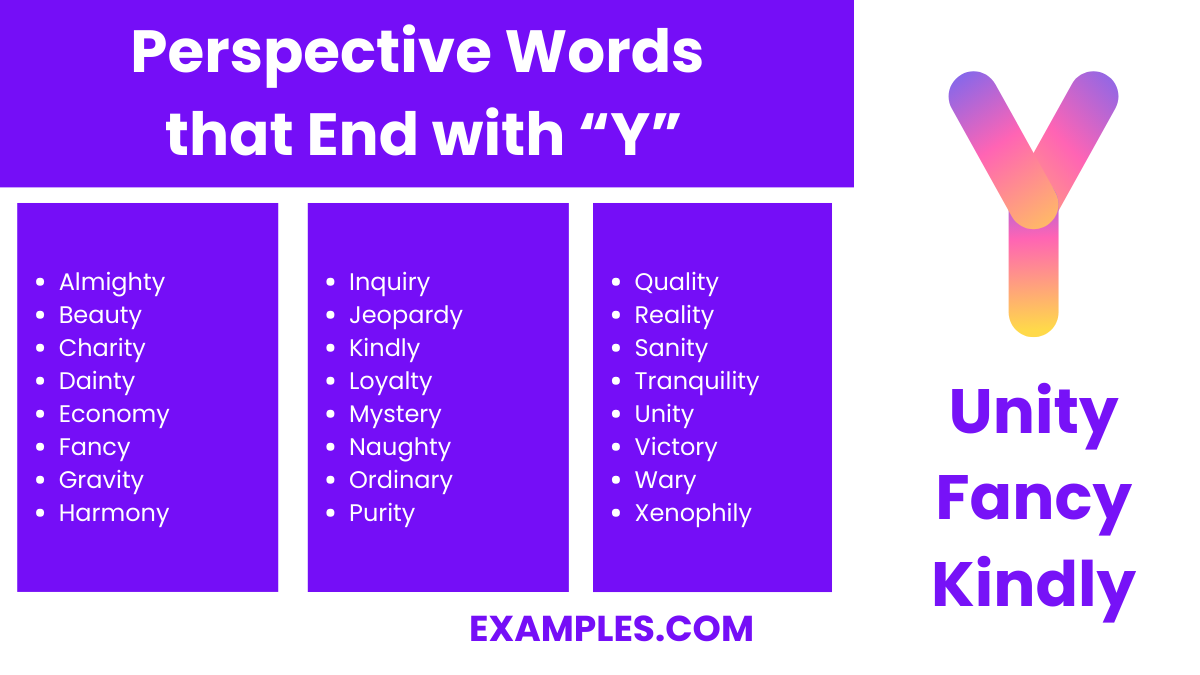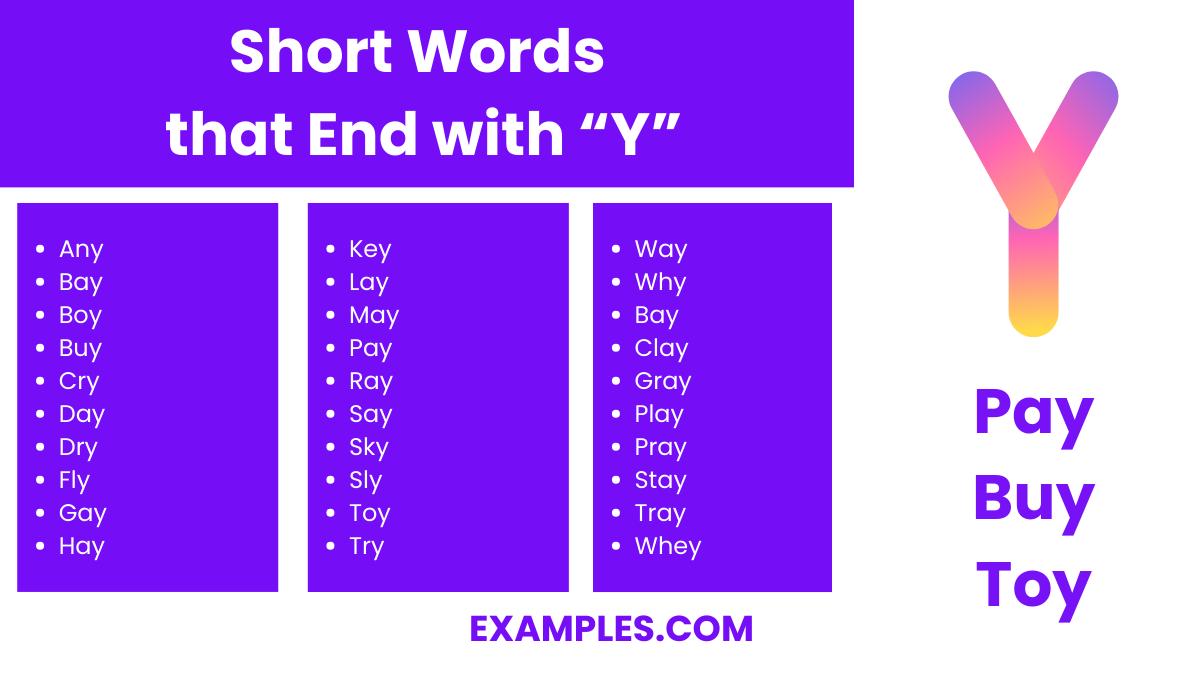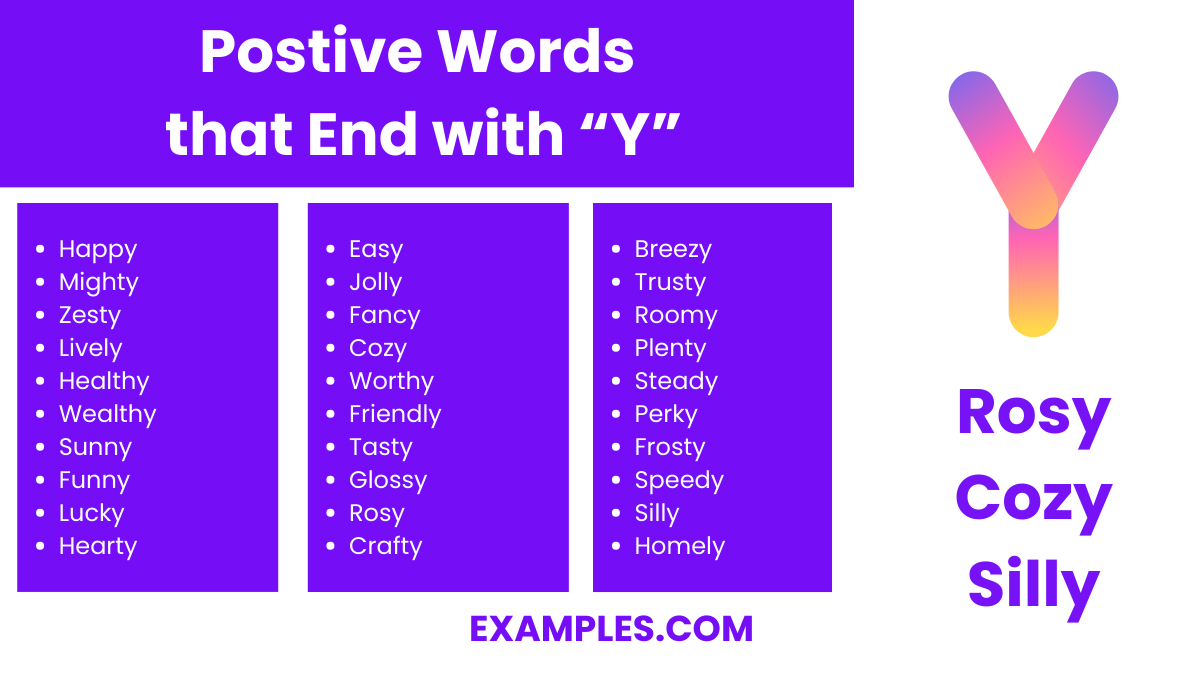150+ Words Ending With Y List, Meaning, PDF
Words ending with “Y” offer a rich tapestry of the English language, spanning various parts of speech including adjectives, nouns, and adverbs. These ‘Y ‘words often convey qualities, states, or actions, making them integral to expressing nuances and emotions. From describing the beauty of a “sunny” day to the tranquility of “serenity,” these “Y”-ending words enrich our communication. Teachers and students alike can benefit from exploring this diverse group, which includes everything from everyday language to more complex terms. This exploration not only broadens vocabulary but also enhances understanding of language patterns, making it a valuable exercise for linguistic development.
Download Most Commonly Used Words Ending with Y - PDF
100 Most Commonly Used Words Ending with “Y”
Words ending with “Y” are a significant element in English vocabulary, offering a vast array of descriptive terms, nouns, adjectives, and adverbs. These words are essential for teachers and educators, enabling them to enrich their language lessons and enhance students’ linguistic skills. The versatility of ‘Y’ ending words is remarkable, ranging from everyday terms to more sophisticated vocabulary, making them suitable for a wide range of educational contexts. This extensive list of 150 words is categorized into six columns for easy reference. Each word is unique, ensuring a diverse and comprehensive collection for teaching purposes.
| Happy | Simply | Energy | Fancy | Mystery | Policy |
| Early | Pretty | Plenty | Lonely | Steady | Reality |
| Family | Heavy | Safety | Funny | Wealthy | Quality |
| City | Daily | Friendly | Guilty | Slippery | Unity |
| Country | Ready | Likely | Ugly | Dirty | Serenity |
| Story | History | Easy | Tiny | Hungry | Majority |
| Party | Victory | Only | Holy | Icy | Activity |
| Money | Memory | Crazy | Silly | Worthy | Charity |
| Study | Theory | Angry | Solidarity | Dusty | Army |
| Baby | Primary | Sorry | Mighty | Sunny | Journey |
| Company | Duty | Shiny | Gritty | Merry | Difficulty |
| Body | Empty | Glossy | Greedy | Lazy | Privacy |
| Ability | Healthy | Tasty | Speedy | Noisy | Society |
| Rainy | Sticky | Frosty | Liberty | Windy | Anxiety |
| Industry | Monthly | Spicy | Tidy | Technology | Identity |
| Necessary | Transparency | Sleepy | Grumpy | Beauty | Commodity |
| Variety | Lucky | Agility | Rusty | Inquiry | Dignity |
| Community | Cloudy | Lovely | Epiphany | Loyalty | Category |
Most Trending Words that End with “Y”
The dynamic nature of the English language demands that both educators and learners keep pace with its evolving trends. Words that terminate with the letter “Y” are especially noteworthy for their prevalent usage and the diverse roles they play. Typically, these words encapsulate specific attributes or conditions, making them fundamental in the realm of descriptive language. For educators, weaving these trending words into instructional materials can significantly enrich students’ lexicon and their grasp of linguistic subtleties. Presented herein is a curated selection of 30 contemporary words ending in “Y,” each accompanied by its definition. This compilation serves as a valuable tool for educational settings, enhancing language instruction and proficiency. The list thoughtfully includes rhyming words to aid in memory retention and daily use English words to ensure practical applicability in everyday communication
- Agility – Ability to move quickly and easily.
- Beauty – A combination of qualities that pleases the aesthetic senses.
- Clarity – The quality of being clear and easy to understand.
- Diversity – The state of being diverse; variety.
- Empathy – The ability to understand and share the feelings of another.
- Felicity – Intense happiness.
- Gravity – The force that attracts a body toward the center of the earth.
- Harmony – The combination of simultaneously sounded musical notes to produce a pleasing effect.
- Integrity – The quality of being honest and having strong moral principles.
- Joviality – The quality of being cheerful and friendly.
- Knavery – Unprincipled, untrustworthy, or dishonest dealing.
- Legacy – An amount of money or property left to someone in a will.
- Modesty – The quality of being modest; freedom from vanity.
- Novelty – The quality of being new, original, or unusual.
- Opacity – The characteristic of being difficult to see through.
- Purity – The quality of being pure, free from contamination.
- Quality – The standard of something as measured against other things.
- Reality – The world or the state of things as they actually exist.
- Serenity – The state of being calm, peaceful, and untroubled.
- Tranquility – The quality or state of being tranquil; calm.
- Unity – The state of being united or joined as a whole.
- Validity – The quality of being logically or factually sound.
- Witty – Showing or characterized by quick and inventive verbal humor.
- Xenophily – An affection for unknown or foreign objects or people.
- Youthful – Remaining young and energetic.
- Zealotry – Excessive fanaticism in pursuit of religious, political, or other ideals.
- Quirky – Characterized by peculiar or unexpected traits.
- Rarity – The state or quality of being rare.
- Savvy – Shrewdness and practical knowledge.
- Tenacity – The quality of being very determined.
New & Latest Added Words that End with “Y”
The ever-changing landscape of the English language brings excitement to both teaching and learning, particularly with the introduction of new words. The latest words ending in “Y” breathe new life into the vocabulary, reflecting contemporary cultural and technological advancements. These additions are not only fascinating from a linguistic standpoint but also resonate with current trends, making them highly relevant for educational contexts. For educators eager to refresh their curriculum and captivate students with up-to-date and relatable content, this compilation of 30 newly coined words ending in “Y” is a treasure trove. Delving into these modern terms, complete with their meanings, enriches the learning experience. This list thoughtfully includes both singular and plural words, along with encouraging words, to foster a positive and inclusive educational environment while expanding linguistic horizons.
- Bloggery – Activity related to writing or maintaining a blog.
- Chillaxy – Relaxed or calm in a very comfortable way.
- Cryptocurrency – Digital or virtual currency secured by cryptography.
- Emojify – To convert into or express using emojis.
- Flexitariany – Relating to a diet that is primarily vegetarian but occasionally includes meat.
- Gigify – To turn something into a gig or a freelance job.
- Hacktivisty – Activities associated with hacktivists or politically motivated hacking.
- Influencery – Pertaining to the activities of an influencer.
- Insta-ready – Being ready to be photographed and posted on Instagram.
- Juulery – The act of using a Juul e-cigarette.
- Kombuchary – Related to or involving kombucha, a fermented tea.
- Locavory – The practice of eating food that is locally sourced.
- Memeify – To create a meme out of something.
- Nanotechnology – Technology at the scale of atoms and molecules.
- Omnishamblesy – Being in a state of total disorder.
- Photobomby – The act of unexpectedly appearing in someone else’s photograph.
- Quirky – Characterized by peculiar or unexpected traits.
- Retrofy – To make something resemble styles from the past.
- Selfie-ready – Prepared to take a selfie.
- Textavistery – Activism performed via text messaging.
- Ubiquity – The state of being everywhere at once.
- Veganuary – The practice of adopting veganism in January.
- Webify – To adapt or convert for use on the Internet.
- Xenoboty – Related to xenobots, a type of synthetic life form.
- Yogalosophy – Philosophy or practice combining yoga and personal beliefs.
- Zillennially – In a way that is characteristic of the generation after millennials.
- Zoomify – To make something suitable for video conferencing, especially via Zoom.
- Upcycley – Related to upcycling or repurposing old items.
- Vlogify – To convert something into a vlog format.
- Wiki-fy – To make information suitable for a wiki format.
Noun That Ends with “Y”
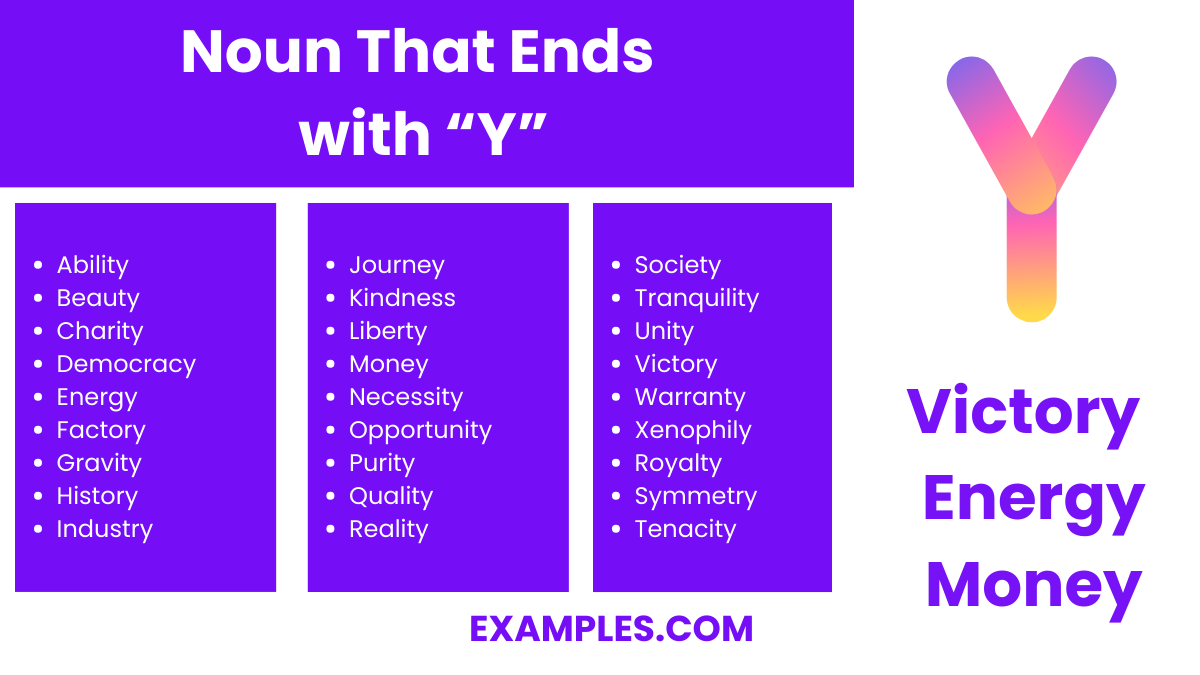
Nouns ending in “Y” present a diverse array of terms crucial for both teaching and mastering the English language. These nouns, often representing objects, concepts, or entities, play a pivotal role in crafting rich and varied sentences. Their scope extends from tangible items to abstract notions, offering flexibility across different contexts in both oral and written communication. This curated collection of 30 nouns concluding with “Y” includes definitions for each, making it an invaluable asset for educators seeking to expand their students’ lexical range. By focusing on these nouns, teachers can significantly bolster their students’ language skills and comprehension, incorporating both difficult words to challenge learners and consonant words to reinforce phonetic understanding.
- Ability – Possession of the means or skill to do something.
- Beauty – A combination of qualities that pleases the aesthetic senses.
- Charity – The voluntary giving of help, typically in the form of money.
- Democracy – A system of government by the whole population.
- Energy – The strength and vitality required for sustained activity.
- Factory – A building where goods are manufactured or assembled.
- Gravity – The force that attracts a body towards the center of the earth.
- History – The study of past events.
- Industry – Economic activity concerned with the processing of raw materials.
- Journey – An act of traveling from one place to another.
- Kindness – The quality of being friendly, generous, and considerate.
- Liberty – The state of being free within society.
- Money – A current medium of exchange in the form of coins and banknotes.
- Necessity – The fact of being required or indispensable.
- Opportunity – A set of circumstances that makes it possible to do something.
- Purity – The quality or condition of being pure.
- Quality – The standard of something as measured against other things.
- Reality – The state of things as they actually exist.
- Society – The aggregate of people living together in a more or less ordered community.
- Tranquility – The quality or state of being tranquil; calm.
- Unity – The state of being united or joined as a whole.
- Victory – An act of defeating an enemy or opponent.
- Warranty – A written guarantee promising to repair or replace an item.
- Xenophily – An attraction to foreign peoples, cultures, or customs.
- Royalty – Members of a royal family.
- Symmetry – The quality of being made up of exactly similar parts.
- Tenacity – The quality or fact of being very determined.
Adverb That Ends with “Y”
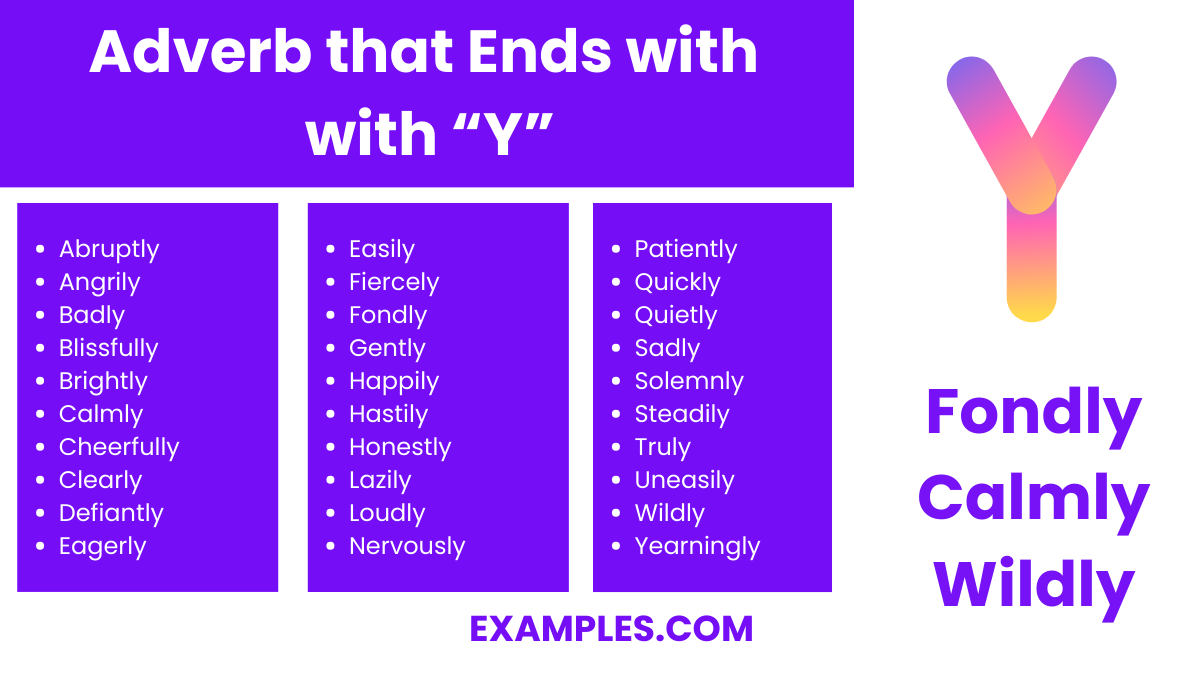
Adverbs ending in “Y” significantly enrich English language education by adding depth and nuance to sentences. They are key in modifying verbs, adjectives, or other adverbs, detailing the manner, timing, location, and degree of actions. These adverbs lend a rhythmic quality to language, making expressions more dynamic and illustrative. For educators, weaving these adverbs into instructional content can markedly enhance students’ grasp of sentence dynamics and eloquence. Presented here is a carefully selected compilation of 30 adverbs concluding with “Y,” complete with definitions, designed to augment vocabulary instruction and bolster effective teaching practices. This collection thoughtfully includes Pictionary words to stimulate visual learning and engagement, along with festive Christmas words to seasonally enrich the educational experience.
- Abruptly – In a sudden, unexpected, and ungraceful manner.
- Angrily – With strong annoyance or displeasure.
- Badly – In an unsatisfactory, inadequate, or unsuccessful way.
- Blissfully – In an extremely happy or joyous manner.
- Brightly – With brightness or liveliness.
- Calmly – In a peaceful and quiet manner.
- Cheerfully – In a happy and optimistic way.
- Clearly – In a way that is easy to see or understand.
- Defiantly – In a manner that shows open resistance or bold disobedience.
- Eagerly – With keen interest or desire.
- Easily – Without difficulty or effort.
- Fiercely – In a powerful, violent, or passionate manner.
- Fondly – With affection or liking.
- Gently – In a kind, mild, or soft manner.
- Happily – In a joyous manner.
- Hastily – With excessive speed or urgency; hurriedly.
- Honestly – In a truthful, fair, or honorable way.
- Lazily – In a slow, relaxed, and effortless manner.
- Loudly – With a lot of volume or noise.
- Nervously – With anxiety or apprehension.
- Patiently – In a way that shows tolerance of delays, problems, or suffering without becoming annoyed or anxious.
- Quickly – At a fast speed; rapidly.
- Quietly – Making little or no noise.
- Sadly – In a sorrowful or unhappy manner.
- Solemnly – In a formal and dignified manner.
- Steadily – At a consistent and unvarying pace.
- Truly – In a truthful or genuine manner.
- Uneasily – In a way that shows discomfort or lack of ease.
- Wildly – In an uncontrolled or unrestrained manner.
- Yearningly – With a feeling of intense longing for something.
Adjective That Ends with “Y”
Adjective words ending in “Y” offer a diverse range of descriptive options, enhancing the expressiveness of language. Teachers and educators can greatly benefit from introducing these adjectives in their lessons, as they provide students with more specific and vivid ways to describe nouns and pronouns. From depicting emotions to describing physical attributes, these adjectives play a vital role in language development. Here is a curated list of 30 such adjectives, complete with their meanings, to assist teachers in expanding the vocabulary of their students and making their language lessons more dynamic and engaging.
- Angry – Feeling or showing strong annoyance or displeasure.
- Busy – Having a lot to do; occupied.
- Crazy – Mentally deranged, especially as manifested in wild or aggressive behavior.
- Dreamy – Having a magical or pleasantly unreal quality; dreamlike.
- Easy – Achieved without great effort; presenting few difficulties.
- Fancy – Elaborate in structure or decoration.
- Greedy – Having an excessive desire or appetite for food.
- Happy – Feeling or showing pleasure or contentment.
- Icy – Covered with or resembling ice; very cold.
- Jolly – Happy and cheerful.
- Kooky – Strange or eccentric.
- Lazy – Unwilling to work or use energy.
- Messy – Untidy or dirty.
- Noisy – Making or given to making a lot of noise.
- Oily – Containing oil; greasy.
- Pretty – Pleasing to the eye or mind aesthetically.
- Quirky – Characterized by peculiar or unexpected traits.
- Rowdy – Noisy and disorderly.
- Silly – Lacking common sense or judgment; absurd and foolish.
- Tiny – Very small.
- Ugly – Unpleasant or repulsive, especially in appearance.
- Vasty – Vast, immense.
- Wealthy – Having a great deal of money, resources, or assets.
- Xenophoby – Dislike of or prejudice against people from other countries.
- Yummy – Delicious.
- Zany – Amusingly unconventional and idiosyncratic.
- Healthy – In good health.
- Gloomy – Dark or poorly lit, especially so as to appear depressing or frightening.
- Fluffy – Of, like, or covered with fluff.
- Edgy – Tense, nervous, or irritable.
Phrasal Verbs That End with “Y”
Phrasal verbs that conclude with ‘Y’ play a crucial role in enriching the English language, lending a more authentic and conversational tone to both spoken and written discourse. These verbs are instrumental in rendering language more accessible and engaging. For educators and teachers, mastering and imparting knowledge of these phrasal verbs can greatly enhance students’ linguistic fluidity and understanding. Below is an extensive compilation of 30 phrasal verbs ending in ‘Y,’ accompanied by their definitions, curated to support language teaching and learning efforts. This list thoughtfully incorporates sight words to aid in recognition and retention, as well as vowel words to ensure a comprehensive exposure to varied phonetic patterns, facilitating a well-rounded educational approach.
- Apply – To make a formal request or application.
- Carry – To transport or hold something while moving.
- Comply – To act according to a rule, order, or request.
- Cry – To shed tears as an expression of emotion.
- Dry – To remove moisture from something.
- Fly – To move through the air using wings.
- Fry – To cook food in hot fat or oil.
- Identify – To recognize and name someone or something.
- Multiply – To increase greatly in number or amount.
- Notify – To formally inform someone.
- Obey – To follow the instructions or commands of.
- Play – To engage in a sport, game, or other forms of entertainment.
- Pray – To address a prayer to God or another deity.
- Qualify – To be entitled to a particular benefit or privilege by fulfilling a necessary condition.
- Rely – To depend on with full trust or confidence.
- Reply – To respond to something.
- Satisfy – To fulfill the desires, expectations, needs, or demands of.
- Spray – To apply liquid in a fine mist.
- Stay – To remain in a particular place.
- Study – To devote time and attention to gaining knowledge.
- Supply – To make something needed or wanted available.
- Terrify – To cause to feel extreme fear.
- Try – To make an effort to do something.
- Unify – To make or become united, uniform, or whole.
- Verify – To make sure or demonstrate that something is true, accurate, or justified.
- Worry – To feel anxious or troubled about actual or potential problems.
- Qualify – To be entitled or fit for something.
- Simplify – To make something simpler or easier to understand.
- Amplify – To increase the volume or strength of sound.
- Decry – To publicly denounce or criticize.
Describing Words That End with “Y”
Describing words, or adjectives, that end in “Y” play a pivotal role in English language teaching. They add depth and clarity to sentences, making them more vivid and expressive. For educators and teachers, understanding and teaching these adjectives is essential for developing students’ descriptive abilities in writing and speech. This list of describing words ending in “Y” provides meanings for each, serving as a valuable resource for enhancing vocabulary lessons. By integrating these words, teachers can significantly improve students’ linguistic skills, encouraging more detailed and nuanced expression.
- Angry – Feeling or showing strong annoyance or displeasure.
- Busy – Having a great deal to do; occupied.
- Chilly – Unpleasantly cold.
- Dreamy – Having a magical or pleasantly unreal quality.
- Easy – Achieved without great effort; presenting few difficulties.
- Fancy – Elaborate in structure or decoration.
- Gloomy – Dark or poorly lit, especially so as to appear depressing.
- Happy – Feeling or showing pleasure or contentment.
- Icy – Covered with or consisting of ice.
- Jolly – Happy and cheerful.
- Knotty – Full of knots; complex or difficult to solve.
- Lazy – Unwilling to work or use energy.
- Messy – Untidy or dirty.
- Noisy – Making a lot of sound, not quiet.
- Oily – Covered with or containing oil.
- Pretty – Pleasing to the eye or mind aesthetically.
- Queasy – Nauseated; feeling sick.
- Rainy – Characterized by rain; wet.
- Salty – Tasting of, containing, or preserved with salt.
- Tiny – Very small.
- Ugly – Unpleasant or repulsive, especially in appearance.
- Vasty – Immense or enormous.
- Wavy – Having a series of curves.
- Xenophoby – Intense or irrational dislike or fear of people from other countries.
- Yummy – Highly pleasing to the taste or smell.
- Zesty – Having a strong, pleasant, and somewhat spicy flavor.
- Cloudy – Covered with clouds; overcast.
- Dirty – Covered or marked with an unclean substance.
- Frosty – Extremely cold with a thin layer of white ice covering everything.
- Gritty – Containing or covered with grit; courageous and determined.
SAT Words That End with “Y”
Delving into SAT vocabulary can be a transformative journey for students, and words ending with “Y” offer a special category of linguistic enrichment. These words, often rich in meaning and context, are pivotal for students preparing for standardized tests like the SAT. They enhance comprehension and expression, key components in achieving higher scores. Teachers and educators can use this comprehensive list of 30 SAT words ending in “Y” to build a stronger, more diverse vocabulary base for their students. Each word is accompanied by its meaning, aiding in understanding and retention. Let’s expand our linguistic horizons with these thoughtfully selected words.
- Anomaly – Something that deviates from what is standard or normal.
- Apathy – Lack of interest or concern.
- Audacity – Willingness to take bold risks; rude or disrespectful behavior.
- Blasphemy – The act of speaking sacrilegiously about sacred things.
- Cacophony – A harsh, discordant mixture of sounds.
- Clemency – Mercy; lenience.
- Complacency – Self-satisfaction, especially when accompanied by unawareness of actual dangers.
- Conformity – Compliance with standards, rules, or laws.
- Disparity – A great difference.
- Efficacy – The ability to produce a desired or intended result.
- Eloquency – Fluent or persuasive speaking or writing.
- Empathy – The ability to understand and share the feelings of another.
- Enmity – The state or feeling of being actively opposed or hostile to someone or something.
- Entropy – Lack of order or predictability; gradual decline into disorder.
- Epiphany – A moment of sudden revelation or insight.
- Euphony – The quality of being pleasing to the ear.
- Fallacy – A mistaken belief, especially one based on unsound arguments.
- Hypocrisy – The practice of claiming to have moral standards to which one’s own behavior does not conform.
- Irony – The expression of one’s meaning by using language that normally signifies the opposite.
- Lethargy – A lack of energy and enthusiasm.
- Mastery – Comprehensive knowledge or skill in a subject or accomplishment.
- Modesty – The quality of being modest; freedom from vanity.
- Necessity – The fact of being required or indispensable.
- Opacity – The quality of being opaque; non-transparency.
- Parody – An imitation with deliberate exaggeration for comic effect.
- Plurality – The fact or state of being plural; a large number.
- Rarity – The state or quality of being rare.
- Solidarity – Unity or agreement of feeling or action.
- Tranquility – The quality or state of being tranquil; calm.
- Vivacity – The quality of being attractively lively and animated.
Perspective Words that End with “Y”
Words concluding with “Y” are pivotal in the English language, encompassing a wide range of meanings that enhance both communication and comprehension. This diverse collection is particularly beneficial for teachers aiming to expand their students’ vocabulary and understanding. Each word serves as a linguistic jewel, capable of expressing distinct viewpoints and subtleties. Spanning from adjectives to nouns, these “Y”-ending words are fundamental not only for vocabulary enhancement but also for fostering a more nuanced grasp of linguistic intricacies. This exploration invites us to delve into the list, uncovering the significance and unique perspectives each word contributes, with a focus on dictation words to aid in pronunciation and spelling practice, enriching the educational experience.
- Almighty – Having complete power; omnipotent.
- Beauty – A combination of qualities that pleases the aesthetic senses.
- Charity – The voluntary giving of help, typically in the form of money.
- Dainty – Delicately small and pretty.
- Economy – The state of a country or region in terms of the production and consumption of goods and services.
- Fancy – Elaborate in structure or decoration.
- Gravity – The force that attracts a body toward the center of the earth.
- Harmony – The combination of simultaneously sounded musical notes to produce a pleasing effect.
- Inquiry – An act of asking for information.
- Jeopardy – Danger of loss, harm, or failure.
- Kindly – In a kind manner.
- Loyalty – A strong feeling of support or allegiance.
- Mystery – Something that is difficult or impossible to understand or explain.
- Naughty – Disobedient; badly behaved.
- Ordinary – With no special or distinctive features; normal.
- Purity – Freedom from contamination or pollutants.
- Quality – The standard of something as measured against other things.
- Reality – The state of things as they actually exist.
- Sanity – The ability to think and behave in a normal and rational manner.
- Tranquility – The quality or state of being tranquil; calm.
- Unity – The state of being united or joined as a whole.
- Victory – An act of defeating an enemy or opponent in a battle, game, or other competition.
- Wary – Feeling or showing caution about possible dangers or problems.
- Xenophily – An attraction to foreign peoples, cultures, or customs.
- Yearly – Occurring once every year.
- Zesty – Having strong, pleasant, and somewhat spicy flavor.
Short Words that End with “Y”
Short words ending in “Y” unveils a treasure trove of linguistic opportunities for educators. These concise yet meaningful words are vital to the fabric of the English language, presenting diverse applications across various contexts. They stand out as an effective means to enrich vocabulary lessons, rendering the learning process both more captivating and thorough for students. This handpicked compilation of 30 short “Y”-ending words, complete with definitions, serves as an invaluable tool for teachers striving to expand their students’ lexical knowledge and comprehension of word formations. The inclusion of funny words in this collection adds an element of amusement, making the educational journey not only informative but also enjoyable.
- Any – Used to refer to one or some of a thing or number of things, no matter how much or how many.
- Bay – A broad inlet of the sea where the land curves inward.
- Boy – A male child or youth.
- Buy – To acquire in exchange for payment.
- Cry – To shed tears, typically as an expression of distress or pain.
- Day – A period of 24 hours.
- Dry – Free from moisture or liquid.
- Fly – To move through the air under control.
- Gay – Joyful and carefree.
- Hay – Grass that has been mown and dried for use as fodder.
- Key – A small piece of shaped metal with incisions cut to fit the wards of a particular lock.
- Lay – To put something down gently or carefully.
- May – Expressing possibility.
- Pay – To give (someone) money that is due for work done, goods received, or a debt incurred.
- Ray – A thin beam of light, energy, or other electromagnetic radiation.
- Say – To utter words or articulate sounds.
- Sky – The region of the atmosphere and outer space seen from the earth.
- Sly – Having or showing a cunning and deceitful nature.
- Toy – An object for a child to play with.
- Try – To make an attempt or effort to do something.
- Way – A method, style, or manner of doing something.
- Why – For what reason or purpose.
- Bay – A broad inlet of the sea where the land curves inward.
- Clay – A stiff, sticky fine-grained earth that can be molded when wet.
- Gray – A color between black and white.
- Play – Engage in activity for enjoyment and recreation.
- Pray – Address a prayer to God or another deity.
- Stay – Remain in the same place.
- Tray – A flat, shallow container with a raised rim, typically used for carrying food and drink.
- Whey – The watery part of milk that remains after the formation of curds.
Positive Words that End with “Y”
The use of positive words ending in “Y” can greatly enhance the tone and mood of any communication, making it a valuable tool for teachers and educators. These words have the power to inspire, motivate, and create a joyful learning environment. Incorporating such words in teaching methodologies can aid in developing a positive mindset among students. This compilation of 30 positive words, along with their meanings, is specifically curated to enrich the vocabulary of teachers and students alike. Let’s dive into these uplifting words and understand their significance.
- Happy – Feeling or showing pleasure or contentment.
- Mighty – Possessing great and impressive power or strength.
- Zesty – Having a strong, pleasant, and somewhat spicy flavor.
- Lively – Full of life and energy.
- Healthy – In good health.
- Wealthy – Having a great deal of money, resources, or assets.
- Sunny – Bright with sunlight.
- Funny – Causing laughter or amusement.
- Lucky – Having good luck.
- Hearty – Warm-hearted and affectionate.
- Easy – Achieved without great effort.
- Jolly – Happy and cheerful.
- Fancy – Elaborate in structure or decoration.
- Cozy – Giving a feeling of comfort, warmth, and relaxation.
- Worthy – Deserving effort, attention, or respect.
- Friendly – Kind and pleasant.
- Tasty – Having a pleasant, distinct flavor.
- Glossy – Shiny and smooth.
- Rosy – Sanguine or optimistic.
- Crafty – Clever at achieving one’s aims by indirect or deceitful methods.
- Breezy – Pleasantly windy.
- Trusty – Reliable and dependable.
- Roomy – Spacious.
- Plenty – A large or sufficient amount.
- Steady – Firmly fixed, stable, or not shaking.
- Perky – Cheerful and lively.
- Frosty – Extremely cold with a thin layer of white ice.
- Speedy – Done or occurring quickly.
- Silly – Lacking common sense or judgment.
- Homely – Simple but cozy and comfortable.
In conclusion, words ending with “Y” hold a special charm, often conveying positivity and warmth. When used thoughtfully in writing and teaching, they can bring a sense of joy, comfort, and enthusiasm. For educators and writers, these words are tools to create a more engaging and uplifting tone. Embracing them enriches language, fosters a positive environment, and enhances the overall effectiveness of communication.


